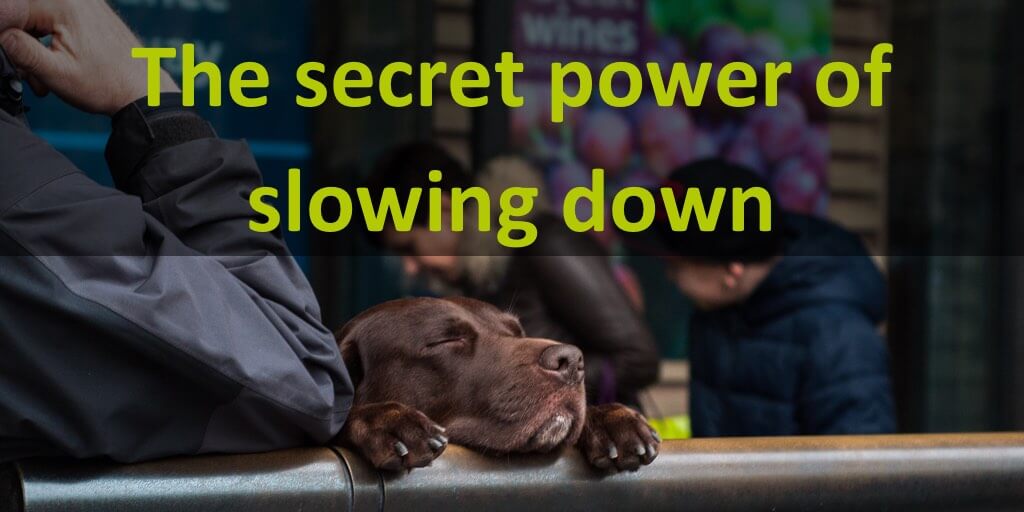The power of slow
We live in a world obsessed by action and success. And in a world hooked on action, the only way to be different is to stop. ~ @thelazyguru
Hi, my name’s Brad.
And I’m a workaholic.
For a significant portion of my career I lived my life with my foot on the gas—and the pedal pushed to the floor. I wanted to get IT ALL done. So I got up early, and stayed up late. I made the most of every minute. I was an early adopter of portable computing devices so that I could work anytime, anywhere. When I started my own business I took that work ethic up a notch and did even more.
While there are definitely parts of me that drove this behavior, I also absorbed a lot of messages about how business needs to move faster and faster. Information, innovation, and all of my competitors were moving faster (so I was told); so if I wanted to stay in the game, I had to keep up that pace. These outside messages only reinforced my personal compulsion to work harder and faster.

I started to worry that the only reward for working really hard was that I ended up with more work. (A pattern that’s clearly not sustainable.)
So I’ve become suspicious of this mantra of work faster and faster, harder and harder. It started when I realized I was exhausted, and that I rarely had time for the things that were really important to me; when I saw myself fitting “life” in around my work time. I wasn’t taking care of myself with healthy habits of eating, sleeping and exercise. I would always say, “I’m going to change right after this project is finished…” But there was always another project!
As I tried to prioritize health, sleep, and exercise, I began to notice some things—especially things that are better done slowly. For instance, you don’t try to get through an art museum as fast as possible, nor do you listen to your favorite music on 2X speed. Good food takes time to prepare and to savor; and the same goes for time with the ones you love the most. You cannot rush time with a toddler, or a teenager, or a life partner. Some things—actually, a lot of things, when you think about it—just take time to experience and enjoy.
There are also things that simply can’t be done faster! Normal people can’t get good rest on 4 hours of sleep; it’s simply not possible. Recovering after a workout takes time. Learning—especially learning to change habits and thought patterns—takes time and repetition.
And while we are constantly offered up these paragons of business who work long hours and never stop, history gives us counter examples. Charles Darwin once said, “a man who dares to waste one hour of time has not discovered the value of life.” But he also worked on average 4 hours per day, and usually concluded his work by noon. Henri Poincare´ authored more than 300 books across a dizzying array of topics while working from 9 – 11AM and 5 – 7PM.
It’s not just empirical evidence. There’s also science that’s telling us this.
You have likely heard of the 10,000 hour rule. This is the idea that becoming an “expert” requires 10,000 hours of deliberate practice. But in the underlying study that produced this “rule” the students who went on to become “experts” also practiced an average of 4 hours per day, and got an average of 1 hour more sleep per day than the students who did not become “experts”. Another study catalogued the work habits of university researchers and found that their creative output (measured by the number of papers they published) peaked at about 4 hours of day in the lab. Those who spent more than that saw their publishing rate markedly decline.
I’m not arguing here for a 20 hour work week—but I am saying that 60+ hour weeks are not sustainable. Our bodies need rest, and our minds need time to recover from highly focused work. It might mean that 8 hours per day staring at a glowing screen under fluorescent lights is a bad idea. Perhaps we need to dedicate ourselves to a noon-day walk, or an afternoon exercise class, or a few minutes doing something fun.
Taking a break may mean that you miss a call, or that someone chooses to buy elsewhere, and that can be devastating. On the other hand, do we need all the business? Is a win by a competitor always a loss for us? Is there such a thing as enough growth?
These are the questions I’m asking myself these days; I wonder, what questions are you asking?
Photo courtesy: Vadim Timoshkin

Could your leadership range restrain
the growth of your business?
Take our self-leadership assessment to identify opportunities
to grow your leadership (which could grow your business).
Get your results instantly without entering your email address.